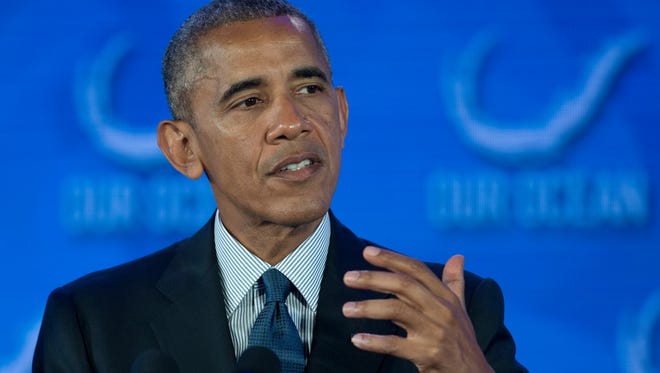Obama orders intelligence agencies to study climate change

NEW YORK — A high-level presidential directive signed Wednesday puts climate change at the center of decision-making on national security, requiring agencies to consider current and future climate trends in all "relevant national security doctrine, policies, and plans."
President Obama has long argued that climate change is a national security issue, and the White House trumpeted the memorandum as an "historic step to address the national security implications of climate change."
But the policy changes are mostly evolutionary, following no fewer than threeexecutiveorders directing federal agencies to take climate change into consideration when adopting policies.
The eight-page presidential memorandum carries the same force of law within the federal government as an executive order, and its policies will carry over into the next administration unless explicitly rescinded by the next president. In fact, the first agency implementation reports required under Obama's order aren't due until February — the month after Obama leaves office. It also sets up a panel, headed by the president's national security adviser and chief science adviser, to catalog data on climate change and its effects — and giving intelligence agencies more of a role in analyzing climate data.
Obama issues 'executive orders by another name'
Alice Hill, a White House adviser on resilience policy, said the memorandum wasn't a top-down directive, but something agencies needed in order to better coordinate their efforts.
"Climate change is a threat," she said. "Our agencies want to protect the nation from those threats."
Obama signed the memorandum while he was in New York for meetings at the United Nations, where he rallied nations on Tuesday to sign on to the Paris agreement "to protect our planet from the ravages of climate change."
Accompanying the president's order is a new report from the National Intelligence Council detailing some of the national security risks of climate change: "Climate-related instability is likely to create strong pressure for foreign aid, disaster assistance, or military responses."
The report asserts that drought and extreme weather in the Middle East and North Africa are already contributing to extremism. Insurgent groups in northern Mali, for example, exploited the drought there by enlisting locals in a “food for jihad” arrangement last year, the report said.